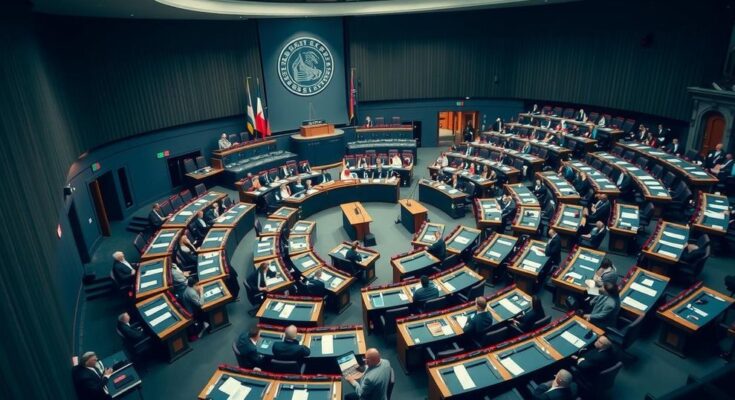The European Parliament discussed Poland’s restrictive abortion laws following a UN report on human rights violations against Polish women. MEPs voiced deep concerns, highlighting the disconnect between governmental promises and actual reform. Amidst internal coalition battles, public outcry and voter sentiment push for change, despite strong opposition from right-wing factions.
The European Parliament recently engaged in a significant debate over Poland’s restrictive abortion laws, prompted by a UN report highlighting severe violations of women’s human rights in the country. This report exposed that many Polish women are trapped in unwanted pregnancies, forced to seek unsafe or illegal abortions, or travel to other nations for legal medical assistance. Polish MEPs voiced their strong discontent regarding these laws. Joanna Scheuring-Wielgus from the New Left expressed concern, stating, “Human rights as well as some women’s rights are being violated in Poland.” She lamented that Polish women who had driven past governmental changes now felt betrayed as the new administration failed to address their plight. Ewa Kopacz, representing the Civic Coalition, added that the abortion ban did not eliminate the practice, merely drove it underground. In stark contrast, right-wing Polish MEPs described abortion as the act of killing an unborn child, emphasizing their opposition to any reform. The recent statements from MEPs came following a devastating CEDAW report, which stemmed from a comprehensive inquiry initiated through collaborations with organizations like the Centre for Reproductive Rights and the Foundation for Women and Family Planning (FEDERA). The tightening of Poland’s abortion laws began when the ruling Law and Justice party (PiS) requested a constitutional court evaluation, leading to a 2020 ruling that enforced a near-total ban on the procedure, permissible only in cases of rape, incest, or threats to the woman’s life. Despite widespread protests against this decision, PiS maintained its alliance with the Catholic Church, disregarding the public outcry. As parliamentary elections approached in October 2023, many dissatisfied women voted for pro-European parties, forming a new government with hopes for reform. However, this coalition, comprising the Civic Coalition, the liberal Left, and the center-right Third Way, faced immediate challenges surrounding the controversial abortion issue. With differing views on how to approach reform, the coalition solidarity was in jeopardy, as seen in a failed vote due to lack of majority support earlier this year.
The backdrop of this discussion is the contentious and restrictive nature of Poland’s abortion laws, intensified after a landmark ruling in 2020 that mostly banned the procedure. The report from the UN and findings from CEDAW underline how these laws undermine women’s rights and safety, compelling them to resort to dangerous measures. Additionally, the rift within the newly formed government coalition reveals the complexities and diversities of opinions regarding necessary reforms in reproductive health legislation.
The debate surrounding Poland’s abortion laws underlines a critical intersection of human rights and political ideologies. While the European Parliament pushes for recognition of these violations, internal divisions within Poland’s new government reveal challenges in enacting significant legal reforms. The voices of Polish women, amplified by MEPs, continue to call for change amidst a backdrop of socially conservative resistance and hopes for a more progressive political landscape.
Original Source: tvpworld.com



